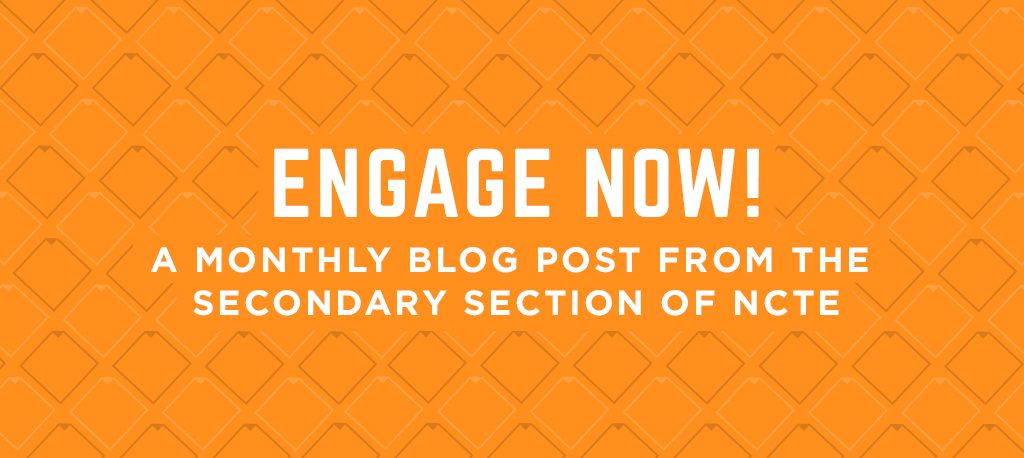From the NCTE Secondary Section Steering Committee.
This post was written by Susan Barber, a member of the NCTE Secondary Section Steering Committee.
Several years ago, one of my students lost her sister to suicide. My student was there when it happened and her life was shattered in a million different ways. A few months later, my students were working on poetry anthologies where they had to choose several different types of poems around a central theme. This student chose to explore grief. I remember having a conversation with her and telling her she could scale back this project if needed because her own grief was so overwhelming at the time. Her reply has stuck with me: “This is necessary work for me because these poems put into words what I am feeling but am unable to express.”
Today—more than ever—we need poetry. Jericho Brown, Clint Smith, Claudia Rankine, Kyle Dargan, Aimee Nezhukumatathil, Maggie Smith, Nate Marshall, Ada Limón (just to name a few) are some modern poets who are standing in the gap as we try to articulate what we feel while living in a pandemic and during times of political unrest. Amanda Gorman’s poem “The Hill We Climb,” read at President Joe Biden’s inauguration, offers hope from a twenty-two-year-old’s perspective. Poetry is all around us.
For years, creating poetry lessons has often seemed like a daunting task for English teachers. Thinking back to college classes with scansion, form, and thematic ideas, we sometimes struggle with how to “break poetry down” for students. Many poetry lessons have been reduced to scavenger hunts for figurative language with little connection to meaning and understanding. Sadly, students are often uninspired and unengaged with poetry in the classroom. And while we can and should teach poetic devices which expand and open meaning for us, we can also carve out space in our classes to simply enjoy poetry.
Several years ago, I began Poetry Fridays as a way to explore different poems, poets, and ideas in a nonthreatening environment. The premise is simple: each Friday we read a poem in class and discuss. There’s no “lesson” (even though there’s discussion, which is often more valuable than a lesson); I just want students to read and think.
Sometimes I choose a poem; sometimes students bring poems. Sometimes we read and sit in silence. Sometimes there’s heated discussion. Every time we read a Friday poem, however, barriers are broken down showing students that poetry is not just for those in academia but for all of us.
If you need a little more structure, here are a few suggestions:
- Read a poem three times. After each reading, have students write a question they have about the poem. This is a good way to open discussion.
- Have students respond in a freewrite.
- Let different students read the same poem and think about different emphasis, inflections, or tone varying from reader to reader.
- Allow students to respond to the poem creatively through drawing or digital art.
I would encourage you to incorporate some time in class to let poetry soak in, just because.
Encourage students to ask questions and be comfortable leaving a poem with more questions than answers. We must move our students away from the idea that poems are puzzles waiting to be solved and toward the idea that poems are opportunities for us to think more deeply on a subject.
As we strive to make sense of this crazy time we’re living in, let’s invite poets into our classroom to help do the work.
 Susan Barber currently teaches English at Grady High School in Atlanta, Georgia, and is an editor and frequent contributor to APLitHelp.com, a website to equip secondary English teachers in practical and creative classroom instruction. She is also a College Board consultant, AP Live and AP Daily video instructor, and cocontributor to both editions of The Best Lesson Series, as well as being featured in the New York Times, the Washington Post, and Edutopia. However, Susan is most proud of the daily work she does in her E225 with her students, as her passion and priority remain the (chaotic) classroom.
Susan Barber currently teaches English at Grady High School in Atlanta, Georgia, and is an editor and frequent contributor to APLitHelp.com, a website to equip secondary English teachers in practical and creative classroom instruction. She is also a College Board consultant, AP Live and AP Daily video instructor, and cocontributor to both editions of The Best Lesson Series, as well as being featured in the New York Times, the Washington Post, and Edutopia. However, Susan is most proud of the daily work she does in her E225 with her students, as her passion and priority remain the (chaotic) classroom.
It is the policy of NCTE in all publications, including the Literacy & NCTE blog, to provide a forum for the open discussion of ideas concerning the content and the teaching of English and the language arts. Publicity accorded to any particular point of view does not imply endorsement by the Executive Committee, the Board of Directors, or the membership at large, except in announcements of policy, where such endorsement is clearly specified.

